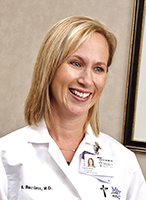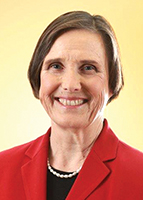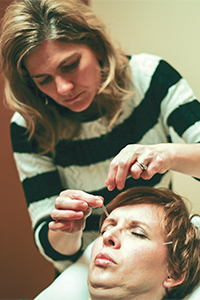By BETSY TAYLOR

Debra Buckmiller undergoes acupuncture at Avera Medical Group-Integrative Medicine in Sioux Falls, S.D. She says those treatments in combination with herbal therapy bring her relief from debilitating migraines and bothersome symptoms of perimenopause.
At the Integrative Medicine Center at Mercy Medical Center, Dr. Suzanne Bartlett practices aspects of medicine differently than she used to. She still diagnoses and treats patients, but Bartlett said her training in integrative medicine led her to adjust her approach, prompting her to spend more time with patients, educating them about nutrition and stress reduction and often talking about spirituality.
The Integrative Medicine Center, located in Cedar Rapids, Iowa, opened a little more than a year ago to combine advances in conventional medicine with evidence-based complementary approaches to care. Care providers' services there include nutritional planning and education about how diet can aid the body's ability to be healthy or heal; assessment related to vitamins and herbal supplements; and mind/body therapies, such as mindfulness stress reduction exercises, cognitive behavioral therapy, biofeedback and yoga.

Bartlett
"There seems to be a hunger for this type of medicine," said Bartlett, who added that area physicians refer patients to her, as she does to them. "The demand has been enormous." In recent months she has had about a six month patient waiting list. This month, she's shifting to providing group workshops, where patients will pay a fee to meet with Bartlett, a therapeutic yoga teacher, psychologist, acupuncturist, and aromatherapist on various topics like menopause, sleep problems, stress and cancer.
Integrative medicine is "… informed by evidence, and makes use of all appropriate therapeutic approaches, health care professionals and disciplines to achieve optimum health and healing," according to The Consortium of Academic Health Centers for Integrative Medicine, a group of 57 academic health centers and affiliates in North America working to advance the principles and practices of integrative medicine. They are among the national organizations sharing research, creating databases related to nutritional and herbal supplements and increasing education related to the mind, body and spirit of patients, explained physicians practicing integrative medicine.
Bartlett, board certified in obstetrics and gynecology, said her son John, now 14, was diagnosed in 2003 with autism. Her husband David, who was not a smoker, was diagnosed with stage IV lung cancer in 2008, and he died of the disease in 2012. Bartlett, who said she only uses evidence-based treatments in her care, realized she and many of her patients had questions about complementary therapies for themselves and their families. She said her integrative medicine education helps her refrain from trying many unproven therapies with her son but also led him to helpful therapies, like breathing exercises that help him keep calm. Integrative medicine treatments brought some comfort to her husband when he was ill as well, she said.
From 2011 to 2013, Bartlett completed a University of Arizona fellowship to practice integrative medicine. She awaits results of the American Board of Integrative Medicine's board certification exam she took in the fall. Physicians sit for this exam, which requires an integrative medicine fellowship as a prerequisite, unless a fellowship waiver has been achieved. Board certification requires knowledge of nutrition and dietary supplements; mind/body medicine, spirituality, and whole medical systems, including traditional Chinese medicine and homeopathy, among other areas.
Dialogue and diagnosis
At the Integrative Medicine Center, Bartlett works in partnership with primary care providers and specialists who have diagnosed patients with chronic disease, gynecologic and hormonal issues, mood disorders, digestive conditions and cancer.
She talks with patients about aspects of their lives that give them meaning, including topics she wouldn't have broached previously. "I would have been terrified to have a conversation with a patient about spirituality a few years ago," she said. She asks patients a lot more probing questions than she once did — seeking details about nutritional supplements, diet, exercise and lifestyle. She uses that information to make recommendations to promote health and healing.

Marlin
Team approach
Dr. Ruth Marlin, who began her career as an internist and is board certified in integrative medicine, said the latter discipline works well as part of a team approach. Much of her practice is with patients at the oncology center at St. Mary's Medical Center in San Francisco, part of Dignity Health, where she provides integrative medicine consults for oncology patients. Marlin co-created a multidisciplinary cancer care team with Dr. Robert Weber, an oncologist and hematologist who is St. Mary Medical Center's chief of staff. "Part of what we (the cancer care team) do is coordination of care," Marlin said.
Marlin said the cancer care team includes an oncologist; oncology nurses with specialties in navigation, radiation therapy and stress reduction; a neuropsychologist; an oncology dietitian; a physical therapist trained in oncology rehabilitation; a pain specialist; a radiation oncologist; a social worker; and a chaplain. Weber calls Marlin "the quarterback," Marlin explained, because in her assessments she determines what therapies might help patients lessen side effects of cancer treatments, reduce pain, build strength and improve quality of life.
Marlin, whose consultations with patients are covered by insurance, said integrative or complementary medicine has gained credibility in mainstream medicine over the years through research.
She noted that the National Center for Complementary and Integrative Health, the federal government's lead agency for scientific research on integrative medicine, is part of the National Institutes of Health. She said the Society for Integrative Oncology works to advance evidence-based, comprehensive health care for those affected by cancer.
Guiding patients

Dr. Dawn A. Flickema places acupuncture needles on Debra Buckmiller at Avera Medical Group-Integrative Medicine in Sioux Falls, S.D.
Marlin said many doctors have found they need to know more about integrative medicine because it's an area of interest for patients. For example, "many patients come in with supplements they hear about from the Internet, family members or other patients," she said. There are supplements that may help them, but others have no proven benefit or may interfere with another medication or treatment.
One patient who said integrative medicine had made a tremendous difference in her ability to cope with a chronic condition is Debra Buckmiller, 48, of Hartford, S.D. She used to get debilitating migraines almost weekly with severe head pain, numbness down the right side of her body, severe nausea, slurred speech — and, in one instance, trouble seeing in one eye. Her symptoms sometimes sent the Avera Medical Group coding and reimbursement specialist to the emergency department. She took medications with strong side effects over the years to try and quell her headaches.
About a year and a half ago, she started seeing Dr. Dawn A. Flickema at Avera Medical Group–Integrative Medicine in Sioux Falls, S.D. The clinic has been open for three years. Flickema brought relief to Buckmiller, who also is perimenopausal and has hot flashes, with acupuncture and an herbal therapy. Buckmiller said she experiences fewer headaches and no longer takes medications her body had struggled to tolerate. "It's like a night and day difference," she said.
Flickema, who is board certified in family medicine and integrative medicine, continues with her family practice two days a week and focuses on integrative medicine the other three. She said she gets plenty of referrals from physicians, and patients self-refer to her integrative medicine practice. She added, "More and more patients come in looking for (integrative medicine) therapies, not prescription medication."
Copyright © 2014 by the Catholic Health Association
of the United States
For reprint permission, contact Betty Crosby
or call (314) 253-3477.